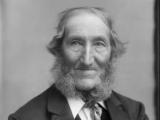At a meeting in Wellington, Marianne Tasker and supporters established a domestic workers’ union, hoping to use the Liberal government’s Industrial Conciliation and Arbitration Act to force employers to improve pay and conditions. Central to their demands was a 68-hour working week.
Liberal Party
Events In History
A world first, the act gave a small means-tested pension to elderly men and women with few assets who were ‘of good moral character’ and were leading a ‘sober and reputable life’. It was one of the major achievements of Richard Seddon’s Liberal government.
Ballance was the first Liberal premier. He laid the foundation for a government that was widely seen as making New Zealand ‘the social laboratory of the world’.
New Zealand’s electoral law had been changed so that no one could vote in more than one general electoral district. This ended the long-standing practice of ‘plural voting’ by those who owned property in more than one electorate.
Articles
State housing
New Zealand's first state house was formally opened on 18 September 1937. But the government has provided rental housing for New Zealanders for more than a century. Explore the history of this country's various state housing schemes and their contribution to the New Zealand way of life. Read the full article
Page 3 - The state steps in and out
The National government introduced full market rents in 1991 to reduce the state role in housing provision. From the start, public debate over state housing policy in New Zealand
Page 8 - Outside the mainstream
Many of us associate the beginning of state housing with the hipped-roof cottages built by the first Labour government of the 1930s and '40s. But the origin of state housing has
Labour Day

Celebrated on the fourth Monday in October, Labour Day commemorates the struggle for an eight-hour working day, a right that carpenter Samuel Parnell had famously fought for in 1840. Our first Labour Day was held on 28 October 1890, and it has been a statutory public holiday since 1900. Read the full article
Page 1 - Labour Day
Celebrated on the fourth Monday in October, Labour Day commemorates the struggle for an eight-hour working day, a right that carpenter Samuel Parnell had famously fought for in
History of the Governor-General

New Zealand has had a governor or (from 1917) a governor-general since 1840. The work of these men and women has reflected the constitutional and political history of New Zealand in many ways. Read the full article
Page 4 - Responsible government
From the 1840s settlers demanded a say in government. Governor George Grey suspended an overly elaborate constitution in 1846, but the New Zealand Constitution Act 1852 gave male
Temperance movement

Temperance was one of the most divisive social issues in late-19th and early-20th century New Zealand. Social reformers who argued that alcohol fuelled poverty, ill health, crime and immorality nearly achieved national prohibition in a series of hotly contested referendums. Read the full article
Page 2 - Beginnings
Dawn of the New Zealand temperance movement,
A history of New Zealand 1769-1914
In the period between the first European landings and the First World War, Aotearoa New Zealand was transformed from an exclusively Māori world into one in which Pākehā dominated numerically, politically, socially and economically. Read the full article
Page 1 - History of New Zealand, 1769-1914
In the period between the first European landings and the First World War, Aotearoa New Zealand was transformed from an exclusively Māori world into one in which Pākehā dominated





















